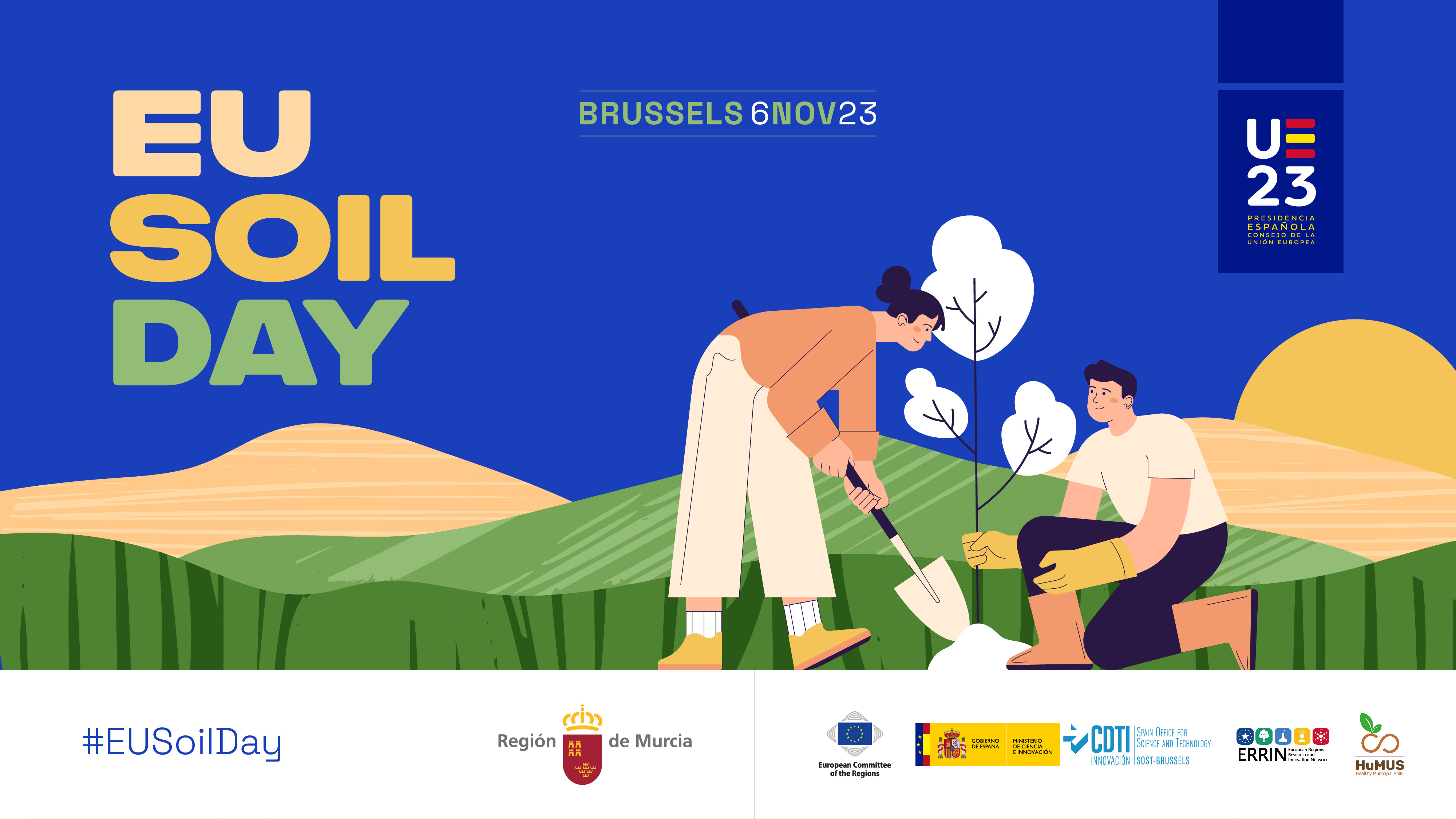
EU Soil Day
The Region of Murcia, together with ERRIN, the HuMUS project and with the support of the EU Spanish Presidency, is organising the ‘EU Soil Day’, taking place on 6 November at the EU Committee of the Regions.
The event will be an opportunity to have an overview of the EU Soil agenda, both from the policy and projects point of view, and with a specific territorial approach. During the event, the Mission Soil secretariat will provide an update on the state of play of the Mission Soil.
ERRIN members will share good regional and local governance models addressing the EU Healthy Soils challenge from an ecosystem perspective, while the HuMUS project will present the Cascade funding call for local authorities to address the soil challenges through participatory processes.
Additionally, representatives from Directorate-General for Agriculture and Rural Development (DG AGRI), DG Environment (ENV), DG Climate Action (CLIMA) and CINEA will enrich the content and discussions and we will be able to learn about challenges and solutions on the ground from EU funded projects. See the agenda attached.
- 06/11/2023 - 09:30 - 06/11/2023 - 18:00
-
European Committee of the Regions
Rue Belliard 99/101
1040 Bruxelles
Belgium - Gianpiero Petruzziello
-
Working Group

Management Board elections 2023 – results
Following the call for nominations for ERRIN Management Board held between 20 September and 5 October, we are happy to announce the nominated Management Board members:
- Romain Nivelle, Hauts-de-France Region
- Janne Leino, Helsinki EU Office
- Lucía Huertas, Region of Murcia / Instituto de Fomento
- Simon Fredholm, Region Värmland
- Sarah English, Scotland Europa (re-election)
We warmly welcome the five nominees, who will be confirmed as new Management Board members by the membership at the ERRIN Extraordinary General Meeting on 16 November 2023.
More information about each nominee is available here.
ERRIN members could put forward their candidatures for this year’s ERRIN Management Board elections between 20 September and 5 October 2023. In this period, the Secretariat received five nominations for five open seats, which means that the voting procedure is not necessary.
- Ewa Chomicz
- 24/10/2023
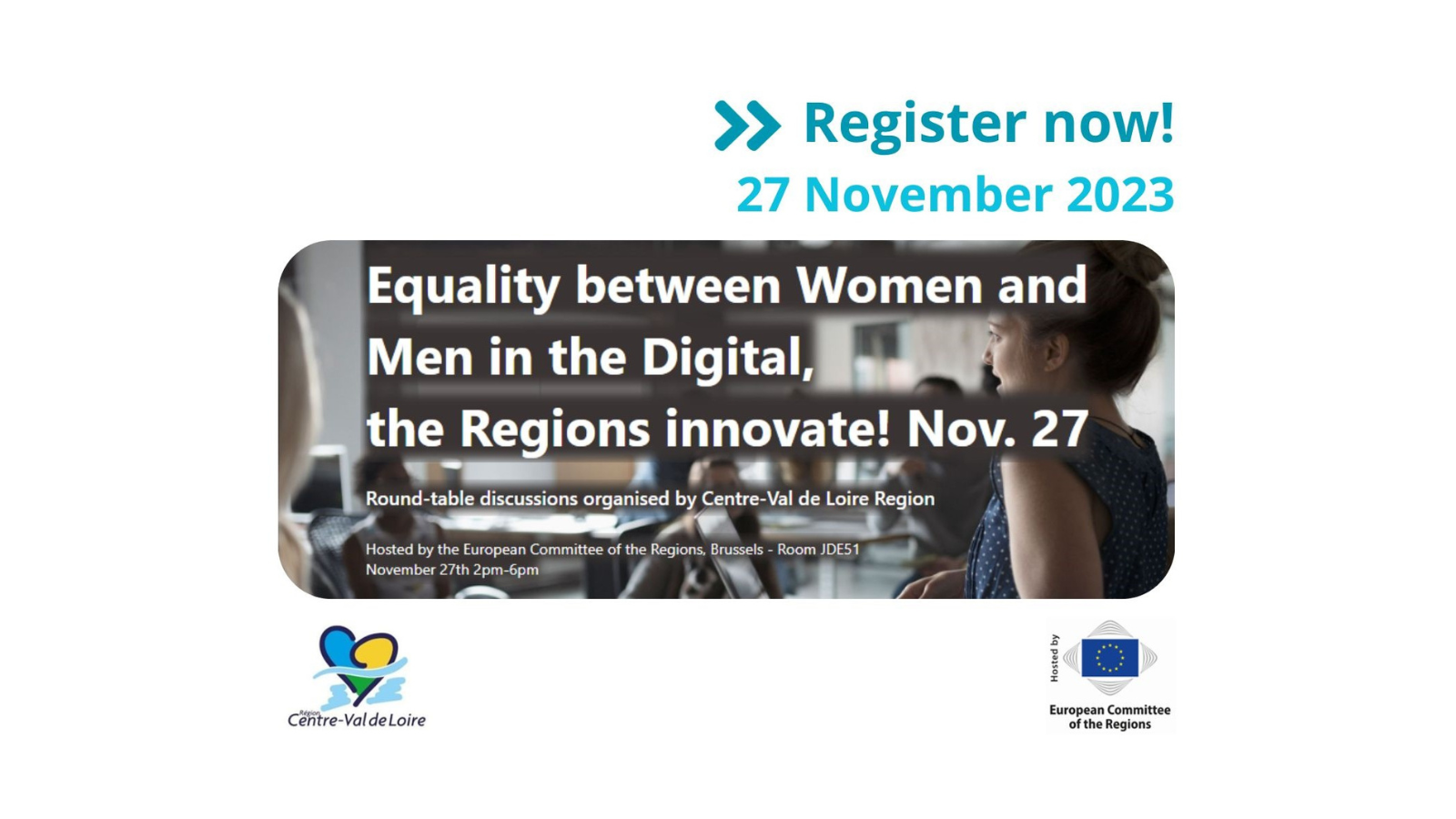
Equality between women and men in the digital sector
The Centre-Val de Loire Region is hosting an event on gender equality in the digital sector.
The issues to be tackled:
- How can we make girls and women more aware of digital careers?
- Leadership support: what tools are needed to help women take on leadership roles?
- What European funding opportunities for equality-related projects?
The event will bring together training organisations, representatives from the Centre-Val de Loire Region and representatives, other European regions members of Earlall, and the European institutions.
Please register here before 16 November.
- 27/11/2023 - 13:30 - 27/11/2023 - 18:00
-
European Committee of the Regions
Rue Belliard 101
Room JDE51
1040 Brussels
Belgium - Florence Goult-Lejeune
-
Member
-
Working Group
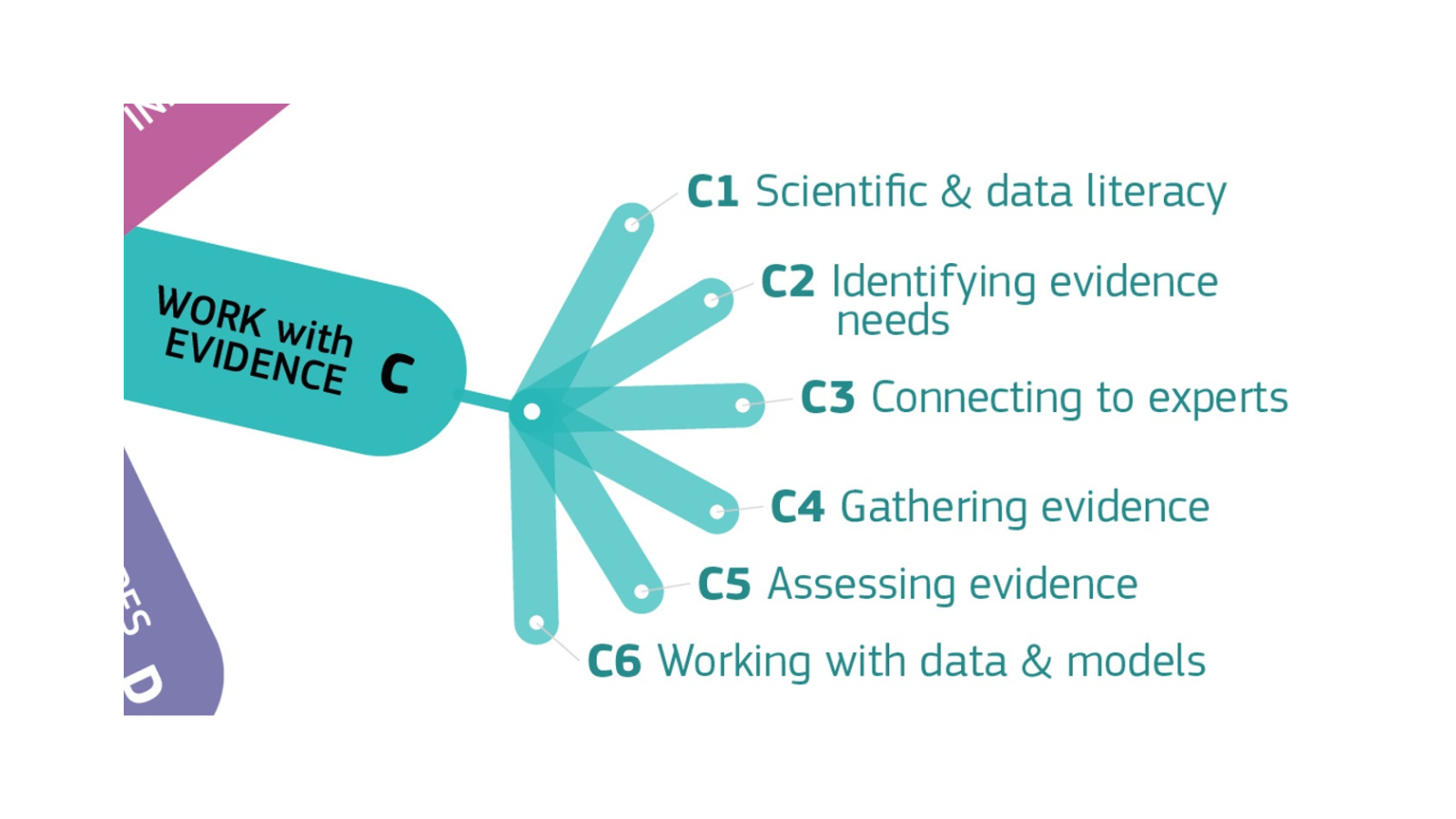
Science Meets Regions Training course on working with evidence for policymakers
As part of the Science Meet Regions Initiative, the JRC has been developing a "Work with Evidence" training course on evidence-informed policymaking, designed to improve policymakers' competencies by zooming in on specific policy fields relevant to local and regional authorities.
After three pilot runs, the JRC will be delivering the final material in an online format.
The course is based on the "working with evidence" cluster of the EC competence model for policymakers. It is built around critical skills in this area, from understanding policy problems and identifying needs to gathering and assessing evidence. It comprises offline self-paced learning and in-classroom sessions, which take 12 hours spread across three days.
The sessions will be taking place on the following dates:
- 22-23-24 November (AM)
- 5-6 December (PM) and 7 December (AM)
The registration form can be found here.
- Francesca Pozzebon
- 20/10/2023
-
Working Group
The Inland Norway University of Applied Sciences is searching for partners for Horizon call: Past, present and future of democracies
- Ingvild Jacobsen
- 20/10/2023
-
Funding Programme
-
Deadline for Expression of Interest15 November 2023
-
NameMr. Sashidharan KomandurOrganisation NameInland Norway University of Applied Sciences
- Get in Touch
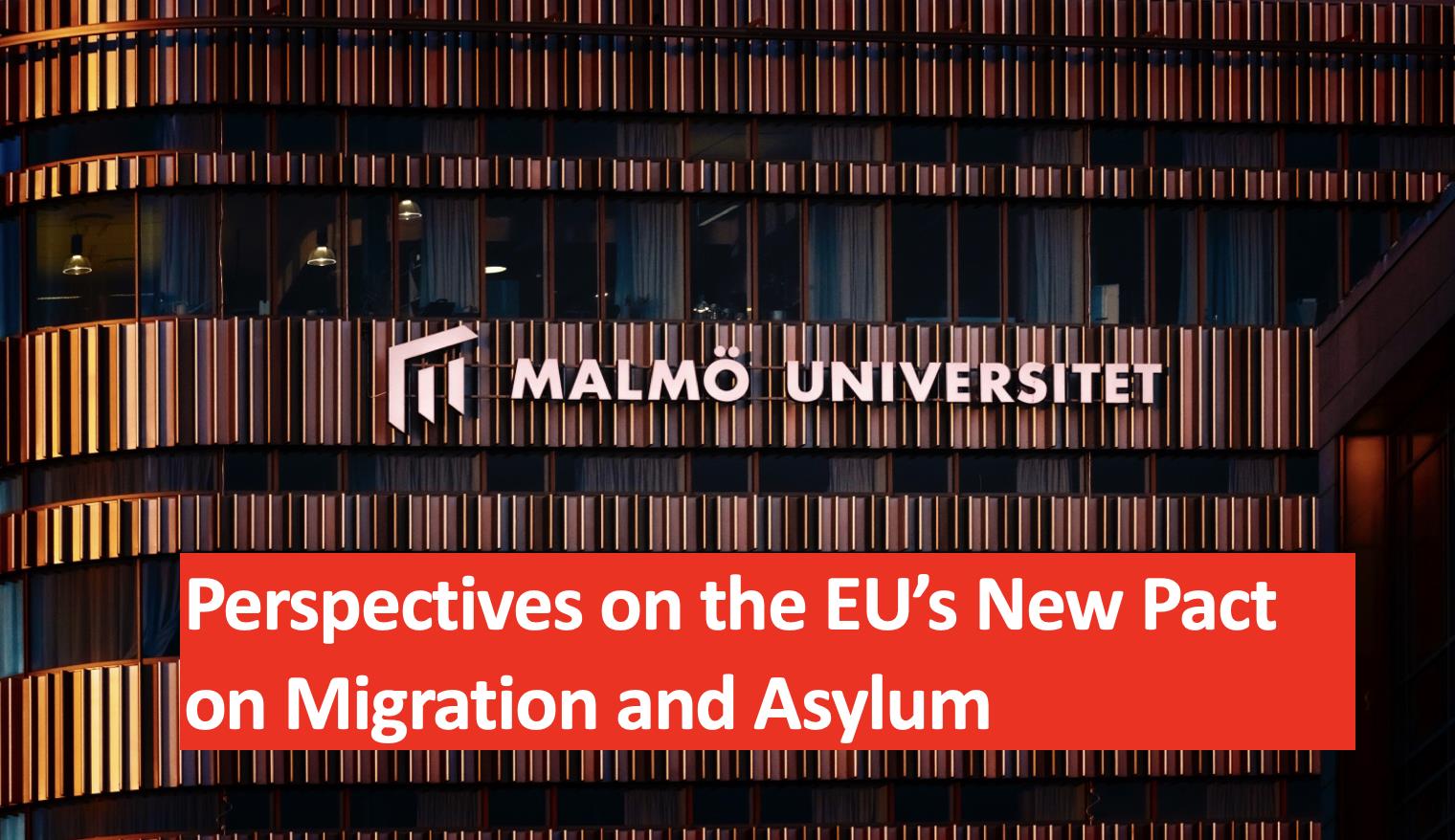
Perspectives on the EU’s New Pact on Migration and Asylum
Hosted by the Malmö Institute for Studies of Migration, Diversity and Welfare (MIM), the symposium Perspectives on the EU’s New Pact on Migration and Asylum is taking place on November 7.
The Symposium convenes academics, experts, policymakers and civil society representatives to discuss the implications of the new set of rules for migration patterns towards and within the European Union.
Three years ago, in September 2020, the European Commission presented the New Pact on Migration and Asylum, a set of regulations that aim to create a fairer, more efficient, and more sustainable migration and asylum process for the European Union. After years on the negotiating table, an "agreement on the pact has never been so close", according to President von der Leyen's State of the Union address in September 2023. If approved, the pact will give the 27 Member States the same rules on reception, welcoming system, crisis management and different procedures to manage the EU's external borders and the people seeking international protection.
How exactly will the pact change the EU’s asylum process, what does it mean for asylum seekers who are rejected, what is envisaged for labour migration and inclusion within Europe, and what are the implications of the agreements with third countries, these are just some of the questions that will be tackled during the two-hour event.
Please register Here
- 07/11/2023 - 13:00 - 07/11/2023 - 16:00
-
Radisson RED Brussels
Rue d’Idalie 35
1050 Brussels
Belgium - Caroline Sundberg
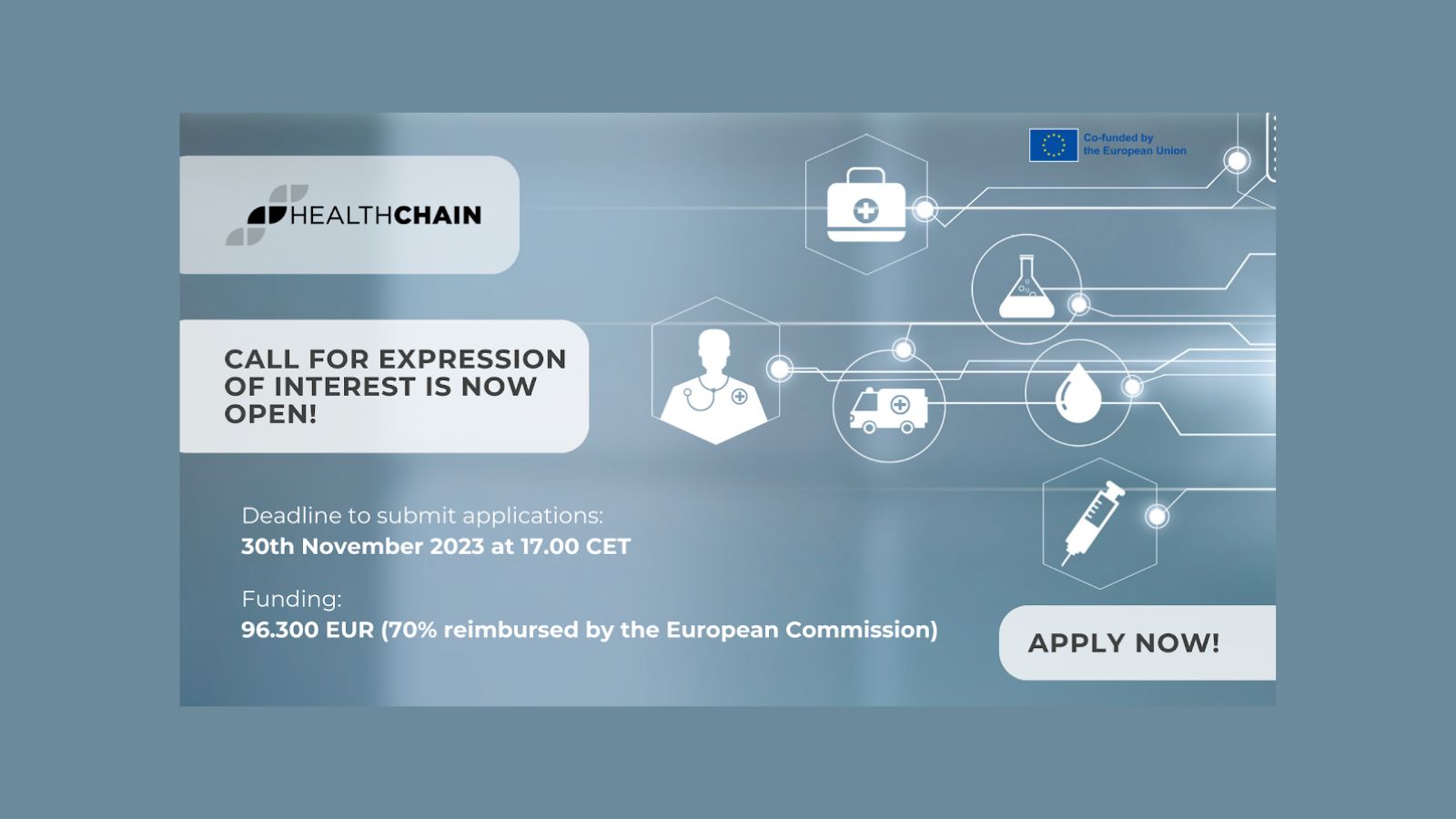
HealthChain project is looking for Mirror Regions
HealthChain is looking for 5 Mirror Regions that could mobilise other regional partners needed for the implementation of HealthChain methodology.
These organisations will become full partner of the HealthChain Consortium, receiving tailored training and funding. Mirror Regions must be linked with a healthcare organisation who can propose an unmet need that requires an innovative solution and is available to co-create a solution with an SME.
HealthChain model is based on an innovative approach that brings together the public and private sectors within regional ecosystems to develop demand-driven digital health solutions through co-creation and interregional cooperation between Ecosystem Supporters, Healthcare Organizations and IT companies. This innovative approach aims to improve the quality of healthcare services for citizens and boost the competitiveness of SMEs companies in the digital healthcare sector.
What are the benefits of becoming a Mirror Region?
- Join a European consortium to collaborate at the interregional level.
- Exchange best practices and implement a ground-breaking model in your region.
- Gain access to an innovative solution for a regional unmet need.
- Get personalised support to implement the model.
- To become beneficiary of HealthChain with access funding up to 96.300 EUR (70% reimbursed by the European Commission).
- Reinforce your regional innovation ecosystem.
An informative webinar will be held on 25 October at 11.30 CEST to provide applicants with further details on who can express interest, timeline and submission process. Save your seat here: https://bit.ly/3F9QHYm.
The Expression of Interest is open until 30 November 2023, at 17:00 CET. HealthChain consortium will select five (5) Mirror Regions based on criteria including relevance, quality, and impact.
For detailed information on the EoI process, eligibility, and how to apply, please visit the HealthChain website at: http://healthchain-i3.eu/mirror-regions/
- Lucy Hammond
- 19 October 2023
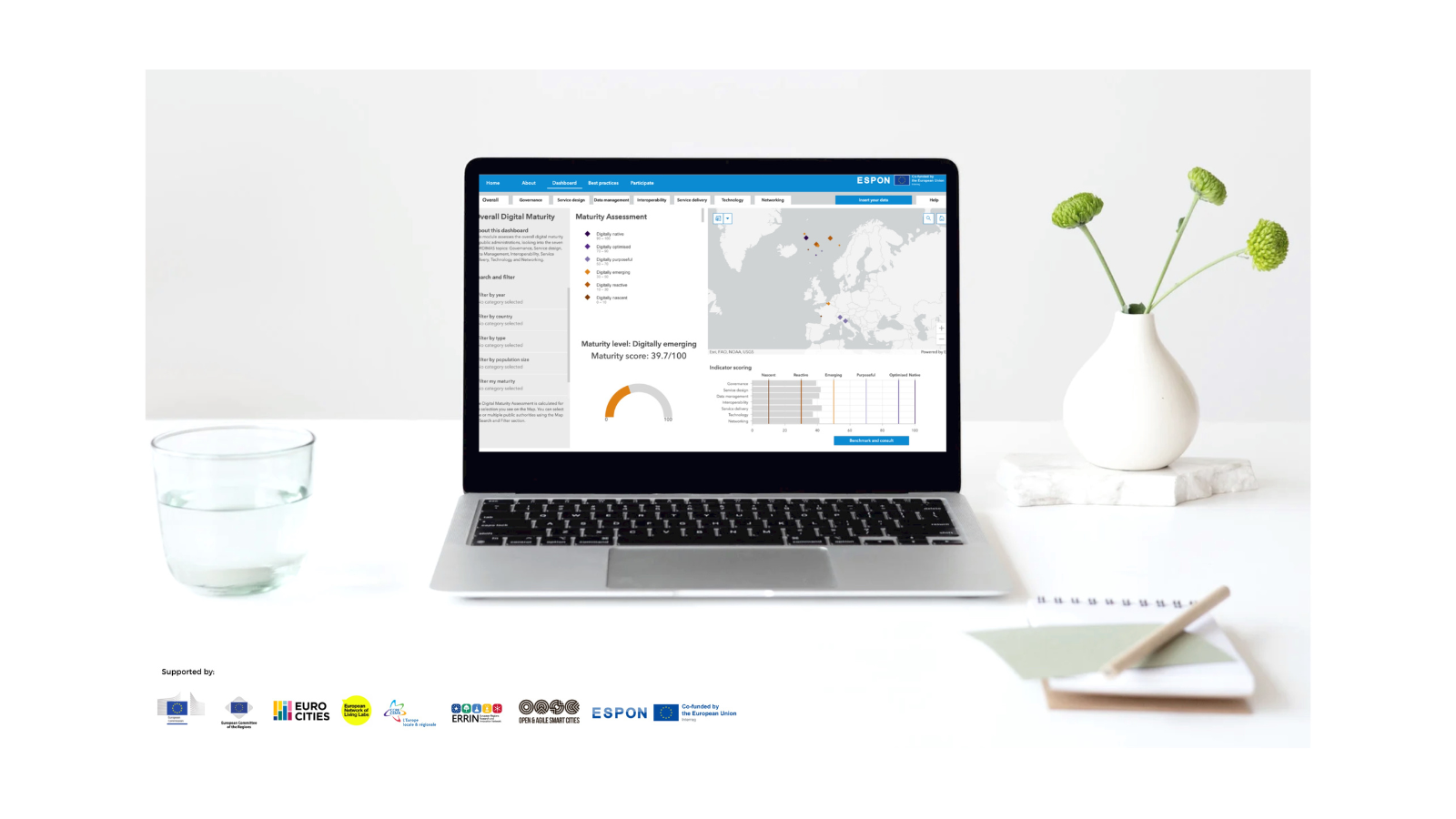
Release of LORDIMAS, a digital maturity assessment tool for Regions and Cities
During the European Week of Regions and Cities 2023, a dedicated session was organised to launch LORDIMAS, your digital maturity assessment. The tool is now accessible, and we invite you to discover it at lordimas.espon.eu.
What is it?
LORDIMAS is an interactive tool helping local and regional governments to understand where they are in their digital transformation journey. It will allow local and regional authorities to:
- Evaluate – Assess your own digital maturity, based on seven dimensions, from governance to networking
- Compare – Discover your results in real-time on an interactive dashboard, allowing you to compare the results with other cities and regions in Europe
- Share – Share your success and challenges to promote the European way for digital transformation
- Learn – Get policy recommendations to bring awareness on emerging topics and policy advice
ERRIN’s role in the creation of LORDIMAS
Through its involvement in Living-in.EU movement and the Go Li.EU project, ERRIN participated in the creation of this tool by supporting the Monitoring and Measuring subgroup. Since January 2023, several activities have been implemented:
- Participation in the drafting of the maturity assessment questionnaire, ensuring the recognition of the role of local and regional authorities in digital transformation.
- Presentation of the tool to the Monitoring and Measuring subgroup of Living-in.EU and the ERRIN ICT Working group in May 2023 (more information here) to involve cities and regions in the creation of the tool.
- Integration of ERRIN members, and partners in the DT4REGIONS project, in the BETA test of the LORDIMAS tool, to gather feedback from key end-users of this maturity assessment tool.
- Coordination of the communication efforts for the launch of LORDIMAS
This tool is an interesting opportunity for ERRIN Members, both to assess their digital maturity but also to promote good practices implemented in different digital-related topics and sectors. If it is of interest to ERRIN members, additional activities will be organised through the ICT Working group and the Go Li.EU project.
If you wish to know more about LORDIMAS, please join a dedicated meeting of the Monitoring and Measuring subgroup of Living-in.EU. The meeting will be held on 27 October 2023, from 10:30 to 12:00 (CEST). You can find more information and registration here.
Should you have any questions, feel free to contact rodolphe.doite@errin.eu.
- Rodolphe Doité
- 18/10/2023
-
Working Group
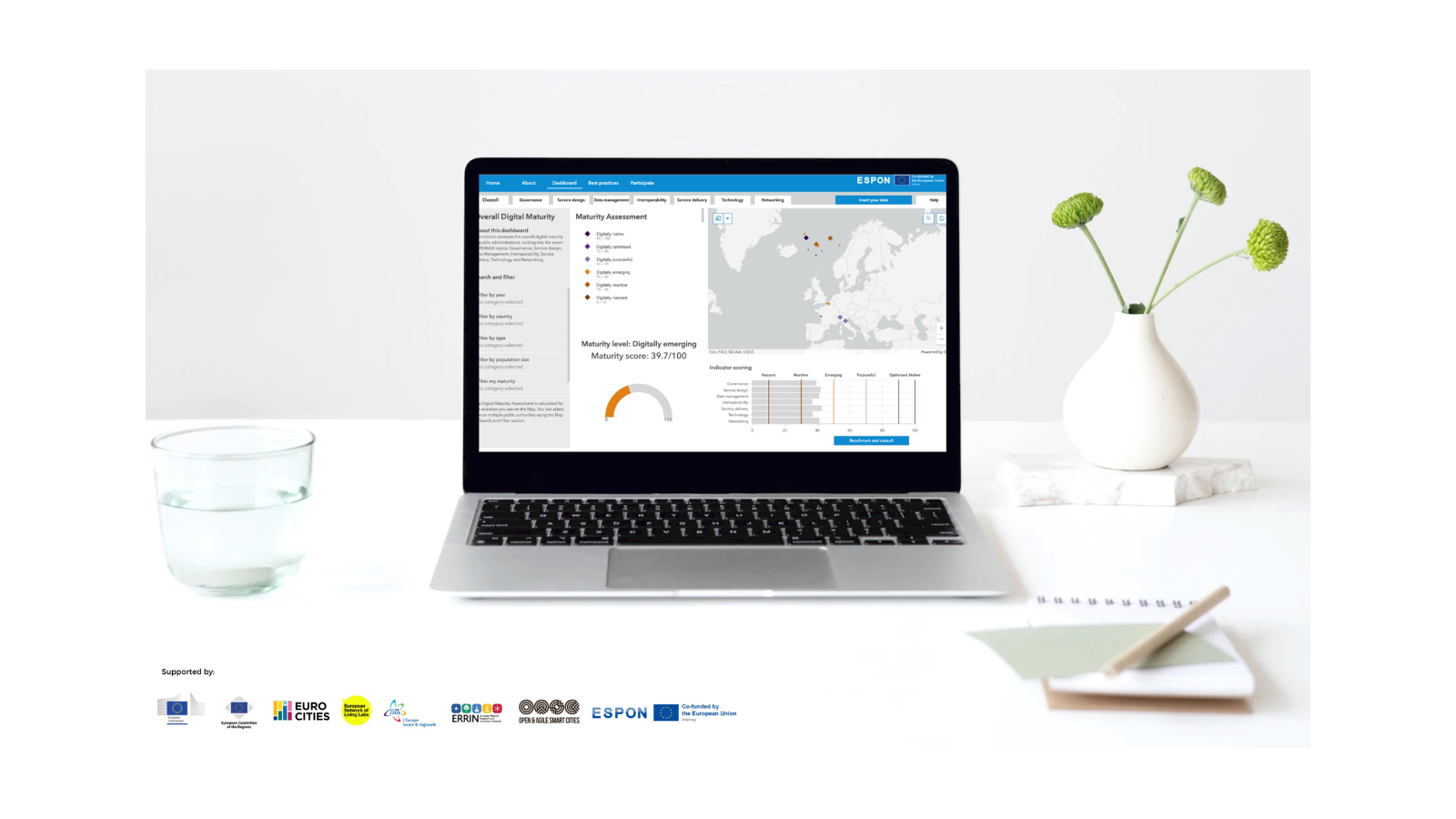
Living-in.EU: Monitoring and Measuring Subgroup meeting #3 - Presentation of LORDIMAS
The Monitoring and Measuring subgroup of Living-in.EU is organising its third meeting in 2023 on 27 October 2023, from 10:30 to 12:00 (CEST). This event will be held online only.
It will be an opportunity to give Living-in.EU signatories and our subgroup members a complete overview of the activities implemented for the creation of the LORDIMAS tool.
LORDIMAS is an interactive tool helping local and regional governments to understand where they are in their digital transformation journey. It was officially launched during the 2023 edition of the European Week of Regions and Cities.
This meeting will aim to:
- Present the finalised version of the tool, providing clear information on how to use it
- Discuss the strategy for populating the tool with data from cities and regions and explore how the subgroup could contribute
- Discuss the next steps for the LORDIMAS tool and explore the interest of the subgroup members in collaborating on its development
This meeting is open to everyone interested in LORDIMAS.
You can register for the event through this link.
Should you have any questions, feel free to contact rodolphe.doite@errin.eu.
- 27/10/2023 - 10:30 - 27/10/2023 - 12:00
- This meeting will take place online
- Rodolphe Doité
-
Working Group

Smart Specialisation WG meeting: Interregional collaboration instruments to boost innovation: taking stock & next steps
The value of interregional collaboration and engaging whole regional and local R&I ecosystems in the processes of achieving broader European policy aims has been increasingly recognised in the recent years. However, as new different EU instruments for interregional collaboration are sprouting, navigating their landscape and trying to identify the ones with most added value for a given territory with its particular conditions is a challenging task. While instruments are there, their specific aims, expected engagement and benefits are often perceived as not clear enough to differentiate between the proposed initiatives, comparatively assess them, convince decision-makers to join them and/or commit necessary resources. This is hindering the uptake, even in territories where general motivation to engage in interregional collaboration and capacity to do so, might already be there.
In this context, the S3 WG is organising a meeting on 9 November from 10:15-12:00 in person at ERRIN premises, with welcome coffee from 10:00. The event will offer a look across four EU initiatives oriented specifically towards interregional collaboration, which have recently been gathering most attention and which offer possibilities of engagement: Thematic Smart Specialisation Partnerships; Interregional Innovation Investments (I3) Instrument; Partnerships for Regional Innovation (PRI); and Regional Innovation Valleys (RIVs). The aim is to take stock and systematise understanding, opportunities offered and next steps of each of these initiatives, following a case-by-case structure. ERRIN members actively engaged in the respective initiatives will be also invited to share their experiences, hands-on insights including encountered challenges and benefits, and exchange with meeting participants. This will be followed by reflections from Wolfgang Münch, Deputy Head of Unit Smart and Sustainable Growth at DG REGIO, European Commission and a discussion with the audience.
You may find the agenda of the meeting attached.
Thank you for attending this Smart Specialisation WG meeting. You may find the presentations from the session on this page.
- 09/11/2023 - 10:15 - 09/11/2023 - 12:00
-
ERRIN
Rue du Luxembourg 3 (8th floor)
1000 Brussels
Belgium - Ewa Chomicz
-
Working Group